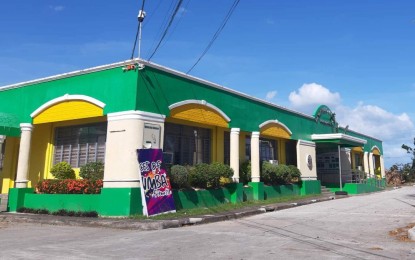
STOP FAKE NEWS. The office of the Department of Health (DOH) 8 (Eastern Visayas) in Palo, Leyte. The DOH on Tuesday (Feb. 4, 2020) asked members of the region’s inter-agency task force to help stop the spread of fake news on the novel coronavirus acute respiratory disease. (PNA file photo)
PALO, Leyte -- The Department of Health (DOH) 8 (Eastern Visayas) here has asked members of the region’s inter-agency task force to help stop the spread of fake news on the novel coronavirus acute respiratory disease (2019-nCoV ARD).
In a meeting Tuesday, regional directors and assistant regional directors of various government agencies decided that the DOH is the only authorized source of information on the illness as fake news has sent people in droves to drugstores, buying face masks and food supplements.
One of the fake news shared by hundreds on social media on February 2 was about a Chinese businessman in Naval, Biliran that he had a history of travel to Wuhan City in China. Netizens said the man manifested symptoms, such as cough and fever.
When visited by local health workers, it was found that the man’s last travel to China was in April 2019 and that he is not sick, according to the Biliran Island FB page.
“Wearing of face mask is not necessary since there is no community transmission of 2019-nCoV ARD in the region. Only sick people are advised to wear a face mask for them not to transmit the infection to others,” DOH-8 Director Minerva Molon told reporters.
Molon urged task force members to help stop the proliferation of false information on social media as it creates anxiety and fear.
The DOH created the task force on nCoV during a meeting at the DOH regional office conference room in Palo, Leyte on Tuesday.
The task force consists of officials of the DOH, the departments of foreign affairs, interior, labor, and tourism, Civil Aviation Authority of the Philippines, Bureau of Quarantine, hospital officials, and several local government units.
“In our meeting, we came up with a decision that all information for public dissemination will be provided by DOH. They also committed to disseminating updates to their respective staff," Molon added.
The DOH reported on Tuesday that two more persons from Eastern Visayas are under investigation while seven others are being closely monitored after their recent travel to China and close contact with suspected carriers of the 2019-nCoV ARD.
Two new patients were confined at the Eastern Visayas Regional Medical Center (EVRMC) in this city on Monday after manifesting flu-like symptoms.
One of the new patients under investigation (PUI) is a 55-year-old man from Leyte with travel history to Israel but made a stop in Hong Kong, a Special Administrative Region of China. He arrived in this city on January 25 and developed a fever on February 2. He is known to have colon cancer.
Another PUI is a 22-year-old woman, a native of Samar province, who traveled to Hong Kong on Dec. 23, 2019, and arrived in Manila last January 4.
She experienced fever, colds, and sore throat on January 19, which led her to seek consultation the next day. However, the headache and fever recurred on February 2, prompting her to seek medical attention again.
The region has four PUIs since the global outbreak of the 2019 nCoV ARD with one already discharged.
The discharged patient was identified as the 36-year-old American man who manifested symptoms days after he arrived in Tacloban City from Wuhan City in China where he worked as an instructor.
To prevent the spread of the virus, the DOH urged the public to practice frequent and proper hand-washing, practice proper cough etiquette, avoid unprotected contact with farm or wild animals, ensure that food is well-cooked, and maintain a healthy lifestyle to boost immunity. (PNA)
